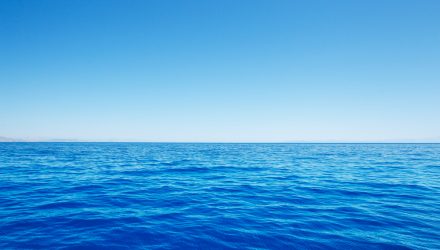Investing sustainability is a byproduct of the environmental, social, and governance (ESG) revolution. As a result, more dedicated sustainability exchange traded funds are coming to market.
Many ETFs in this category simply address climate change or decarbonization, but others go further and address credible investing niches that competitors overlook. Take the case of the IQ Clean Oceans ETF (OCEN). OCEN, which tracks the IQ Candriam Clean Oceans Index, debuted last October.
The concept of cleaner oceans has long been a focal point for environmental groups, but it’s also been largely overlooked by many investors. OCEN flips that scripts, providing market participants with an efficient avenue to clean oceans investing, which is a relevant theme.
“Indeed, according to the OECD, the oceans’ annual contribution to global GDP, already USD 1.5 trillion dollars, is expected to double by 2030, equivalent in size to the world’s seventh largest economy,” according to BNP Paribas research.
For climate-savvy investors, it’s worth noting that ocean investing is very much climate-related and, in many cases, directly tied to climate change. Rising temperatures apply to oceans as well, and that’s having an adverse impact on marine life and food supplies.
“Warmer waters and more CO2 in the atmosphere are contributing to ocean acidification, which is damaging many marine organisms by hindering the hardening of their shells,” added BNP Paribas. “Overfishing is reducing fish stocks just when the world is predicted to need an additional 30 million tonnes of fish by 2030.”
OCEN holds 80 stocks across six sectors, confirming that it’s a diverse play on ocean investing and that diversification is necessary to meet the various demands of improving ocean health. Think of it as “blue economy” investing — a phrase coined by the World Bank.
The blue economy is “the sustainable use of ocean resources for economic growth, improved wellbeing and employment, and the health of the ocean ecosystem,” according to the World Bank.
As BNP Paribas noted, the blue economy is comprised of a variety of concepts, including shoring up fishstocks, plastics recycling, enhancing coastal ecosystem protections, responsible maritime job creation, marine-based renewable energy, and marine biotechnology.
Those are potentially sprawling concepts and, in some cases, new ideas, indicating that OCEN’s diversification could be advantageous to investors. The fund allocates a combined 43.6% of its weight to technology and industrial stocks — sensible allocations for a fund with an ocean investing objective. None of OCEN’s holdings exceed a weight of 3.3%.
For more news, information, and strategy, visit the Dual Impact Channel.
The opinions and forecasts expressed herein are solely those of Tom Lydon, and may not actually come to pass. Information on this site should not be used or construed as an offer to sell, a solicitation of an offer to buy, or a recommendation for any product.
